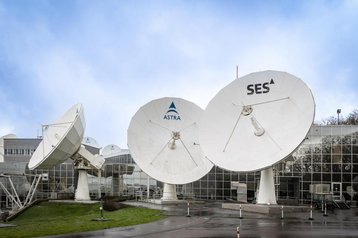Satellite companies SES and Intelsat have officially ended discussions around a potential merger.
“SES announces today that discussions regarding a possible combination with Intelsat have ceased,” the company said in a short statement this week. “On 29 March 2023, SES had confirmed that the company engaged in discussions with Intelsat and that there could be no certainty that a transaction would materialize.”
The two firms had been negotiating a potential $10 billion merger deal since March. Luxembourg-based SES operates more than 70 satellites in Medium Earth Orbit (MEO) and geosynchronous (GEO) orbits. Intelsat operates more than 50 satellites in GEO orbits and is planning an MEO constellation in the future.
Shortly before SES confirmed the news, SpaceNews reported Intelsat had been the one to pull the plug on discussions.
SN said the two companies had been unable to see eye to eye about their potential combination – including the future direction of the business – and were at odds over the distribution of billions of dollars of C-band spectrum clearing proceeds.
“Given the content of recent discussions — and the fact that the SES-aligned parties would not agree to certain business fundamentals important to Intelsat stakeholders — Intelsat concluded that a combination in fact would not create sufficient value compared to Intelsat going in a different strategic direction,” an unnamed source told the publication.
French satellite firm Eutelsat is in the process of buying the UK's OneWeb, as satellite operators seek to compete against Elon Musk-owned SpaceX's Starlink and Amazon's Project Kuiper.
Back in 2021, US satellite firm Viasat struck an agreement to acquire UK satellite operator Inmarsat for $7.3 billion. That deal closed earlier this month after overcoming competition concerns from regulators.
SES CEO Steve Collar announced this month that he plans to step down from the company at the end of June, with Ruy Pinto, currently chief technology officer, will take over on an interim basis. SES said the move was not related to the merger.
This month saw Intelsat preparing a bid request to industry for 18 MEO satellites to launch starting in 2027. The company is expected to issue an RFP soon. SES operates in MEO with its O3b constellation and is set to launch its successor O3b mPower network soon.
Intelsat has also ordered a Mission Extension Pod (MEP) from Northrop Grumman Corporation’s SpaceLogistics unit to extend the life of one of its satellites. The MEP will launch in 2025, attach itself to an Intelsat GEO satellite and extend its life by at least six years. This is the fourth such deal between the companies and the second announced this year. Intelsat 901 and Intelsat 10-02 saw MEPs launched and attached in 2019 and 2021 respectively, each seeing five years added to the lifespans.
In other satellite news:
- Holding company Libra Group has announced a new space asset-holding company called Space Leasing International (SLI). Libra currently operates companies in the aviation, real estate, hotel & hospitality, and renewable energy industries.
SLI is to build a ground station in the Alaskan Arctic that will be leased to satellite data communications firm RBC Signals. SLI has also committed to acquire or build an additional 20 ground stations around the world within the next three years, which will also be leased to RBC Signals. The company said it aims to also buy satellites and spaceports in the future.
- Direct-to-cell satellite firm Lynk and PNCC, Palau’s largest mobile network operator, announced the start of initial commercial services across the country. Service will start with two remote islands in the southwest territory of Palau - allowing those folks to communicate via SMS for the first time ever via mobile phone. This is the first commercial launch utilizing Lynk services.
- Another direct-to-cell sat firm, AST SpaceMobile, recently successfully achieved space-based cellular communications at 4G speeds using unmodified smartphones via AT&T spectrum and Nokia RAN technology. The tests saw download speeds above 10 Mbps from the company's BlueWalker 3 satellite.
- A SpaceX rocket successfully launched Indonesia’s new PSN Satria satellite. The Ka-Band satellite will cover the entire Indonesian territory and provide over 150 gigabytes per second once it has ascended to its position in GEO orbit.
- Google spinout Aalyria – born out of the company’s Loon high altitude balloon project – has partnered with Leidos to integrate its Spacetime networking technology with the defense firm’s network management and protection solutions.
- Chinese satellite firm GalaxySpace has been conducting LEO satellite tests with local research institutions over the South China Sea. The firm launched six satellites into orbit last year.
- Rivada Space Networks has signed a Memorandum of Understanding (MoU) with network integrator Artel LLC to provide LEO satellite services to US government agencies.
- Ramon.Space has partnered with Foxconn subsidiary Ingrasys which will see the manufacturer build Ramon.Space’s space computing products.
- AsiaSat has acquired content distribution and media solutions company Lightning International.
- Technology firm Humanitas Solution has revealed a new high altitude pseudo satellite (HAPS) platform. The Vertex, from Humanitas’ xspace.ai unit, looks to be a long tube equipped with a number of fans. Details are scarce, but the company said the platform has on-board compute for 5G applications.







